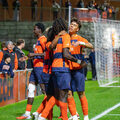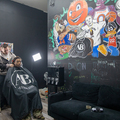MBB : Extreme measures: Syracuse experienced unprecedented success on court despite obstacles off it
The 2011-12 Syracuse team had the best regular season in program history and returned to the Elite Eight for the first time since 2003. The Orange rose to the No. 1 ranking in the nation at one point and finished its season an impressive 34-3. The Daily Orange beat writers look back at the season and grade the performance of the players and head coach Jim Boeheim.
MVP
Dion Waiters
At one point in the season, Jim Boeheim called Waiters the team’s best defensive player. And after SU’s last game of the season, Boeheim called Waiters the team’s best offensive player. He carried the team in both games of the Big East tournament and reached double figures in scoring in 12 of 13 games during one streak. His seemingly endless offensive repertoire made him the go-to option for Syracuse late in the shot clock and late in the game.
Most improved
Fab Melo
Though Melo did not play in the NCAA Tournament, he was, overall, the most improved player on the Orange. The sophomore went from a raw, out-of-shape freshman center to a force in 2011-12, winning the Big East Defensive Player of the Year award. He set a single-game school record with 10 blocks against Seton Hall.
Biggest surprise
Suspension of Fab Melo
Two days before Syracuse was to begin its march to New Orleans, the Orange lost arguably its most valuable player. Melo, the anchor of the 2-3 zone and the Big East Defensive Player of the Year, was deemed ineligible for the entire tournament. It changed the dynamic of Syracuse’s offense and defense. SU suddenly became a below-average team on the interior. The Orange ultimately came up short without him against an Ohio State team led by dominant forward Jared Sullinger. All season-long it seemed like Syracuse was destined to reach the Final Four behind one of the most balanced rosters in the country. The loss of Melo created a serious imbalance and set the stage for an early exit.
Biggest disappointment
Rakeem Christmas
Christmas goes into the offseason almost exactly like Fab Melo did last year. He didn’t live up to his McDonald’s All-American status by any means and looked lost at times. Boeheim even said after SU’s win over West Virginia that he thought the freshman was sleeping against the Mountaineers. Christmas showed flashes of potential filling in for Melo at Cincinnati and early in the NCAA Tournament, but he’ll need to bring that every game next year to live up to the lofty expectations that come with being a top recruit.
Jim Boeheim
A
Amid all of the controversy, the potential for off-the-court distractions and dealing with the loss of his starting center – twice – Boeheim put forth one of his best coaching jobs. It was the best regular season in school history and the Orange’s first Elite Eight appearance since 2003.
Dion Waiters
A
Though his last game in a Syracuse uniform was disappointing at best, Waiters was the Orange’s best player this season. He scored 12.6 points per game off the bench in only 24.1 minutes per game. Overall, Waiters, who announced he will go pro Monday, dazzled by making scoring seem incredibly easy and cemented himself as one of the best guards in the country.
Fab Melo
A-
This grade applies solely to his performance on the court, and when he played, Melo was the most important piece of Syracuse’s 2-3 zone. Head coach Jim Boeheim said the sophomore made the biggest single-season improvement he has ever seen, culminating in Melo’s Big East Defensive Player of the Year award.
Scoop Jardine
B+
Entering his senior season, the Orange point guard had a love-hate relationship with Syracuse fans. But that hate drifted away as he displayed an improved command of the offense and better decision-making all yearlong. He averaged 13.8 points and 6.3 assists per game in the NCAA Tournament.
C.J. Fair
B+
For a stretch, Fair was Syracuse’s best player. Defense, scoring, rebounding – he did it all in the middle of the season for the Orange. But Fair fell off hard in the final eight games of the year. He reached double figures in scoring just once in that stretch, and his contributions were missed.
Brandon Triche
B-
Triche was a key supporting player in his freshman and sophomore years and had a shot to become one of the go-to scoring options in 2011-12. He started every game for the third straight season but endured a couple of shooting slumps.
James Southerland
B-
The Southerland that showed up in Pittsburgh for the NCAA Tournament and the one that started the season probably would get somewhere around an A, but there was also the Southerland who disappeared midway through the season that knocked this grade down a bit. The junior averaged just 5.2 points per game in Big East play and was relegated to the bench in key games throughout the year.
Kris Joseph
B-
In reality, Joseph deserves something in the C range. He couldn’t become a consistent scorer like Wes Johnson, and he couldn’t be viewed as a go-to option late in games. But it’s hard to grade Joseph lower than a B- considering he did lead the Orange in scoring at 13.4 points per game.
Baye Keita
C
Keita’s offensive shortcomings and rail-thin physique prevented him from getting more playing time this year, especially with Fab Melo developing into a defensive force. But the center played his role OK throughout the year, finishing second on the team with 35 blocks and consistently fighting for rebounds down low in limited action.
Rakeem Christmas
C-
The McDonald’s All-American was a disappointment in his first season with the Orange. Although Christmas started every game other than the two in the Big East tournament, he only averaged 11.5 minutes per contest and was a nonfactor for most of the year.
-Compiled by The Daily Orange Sports staff




